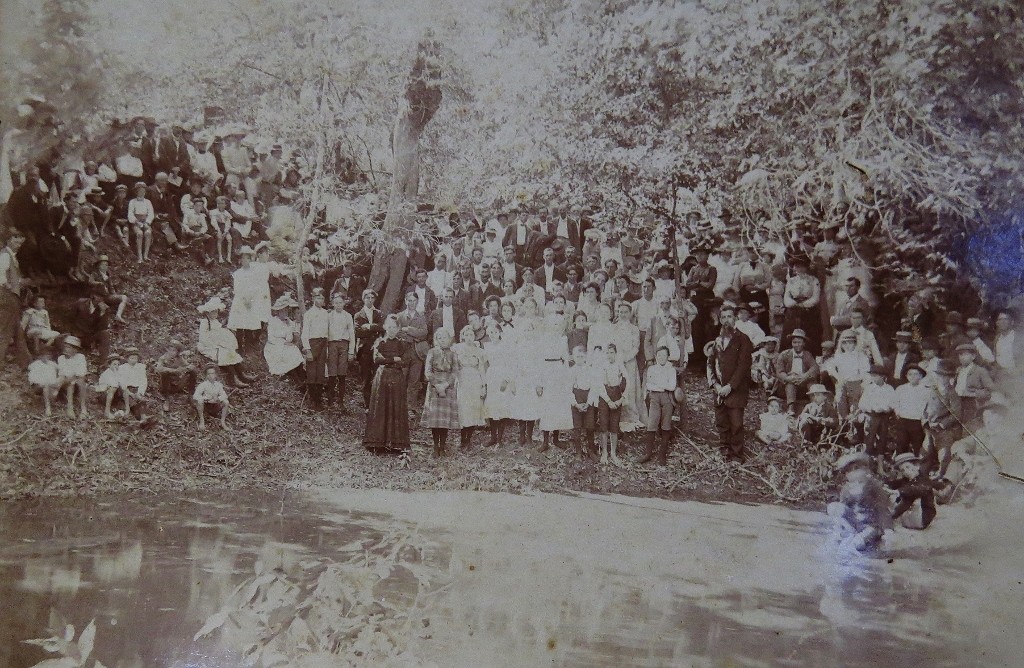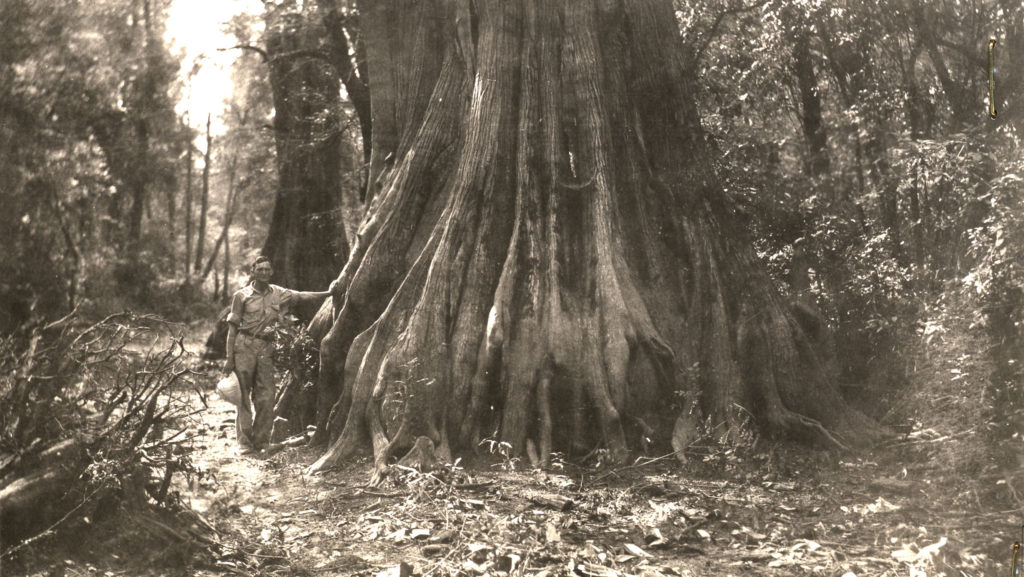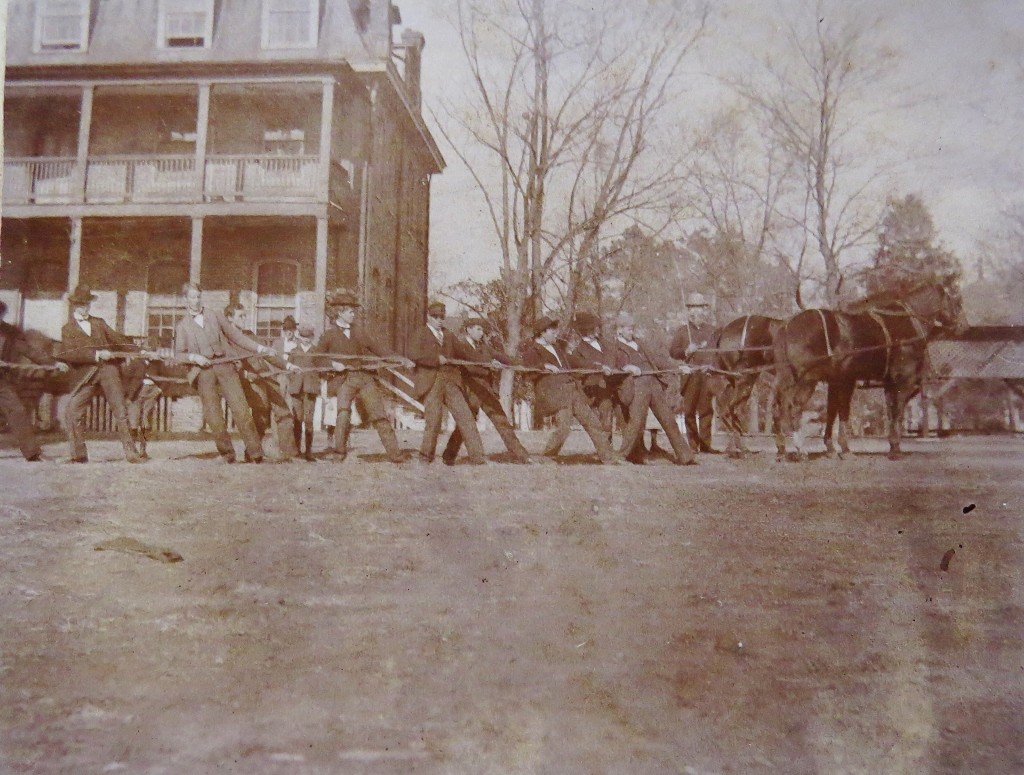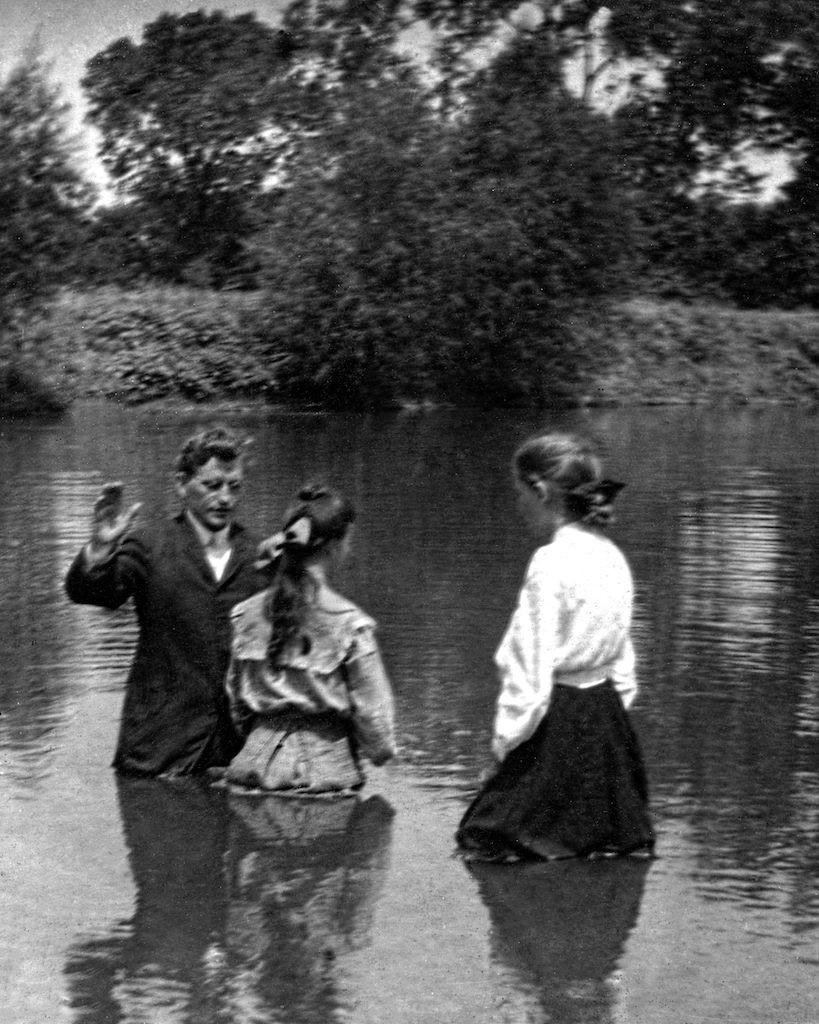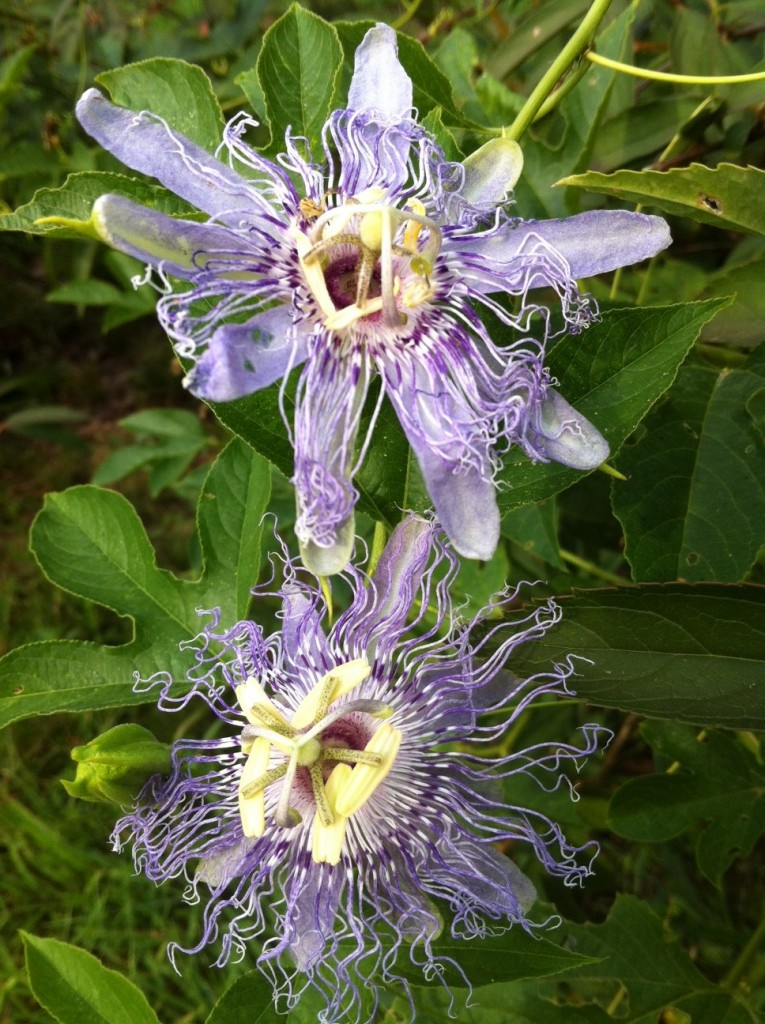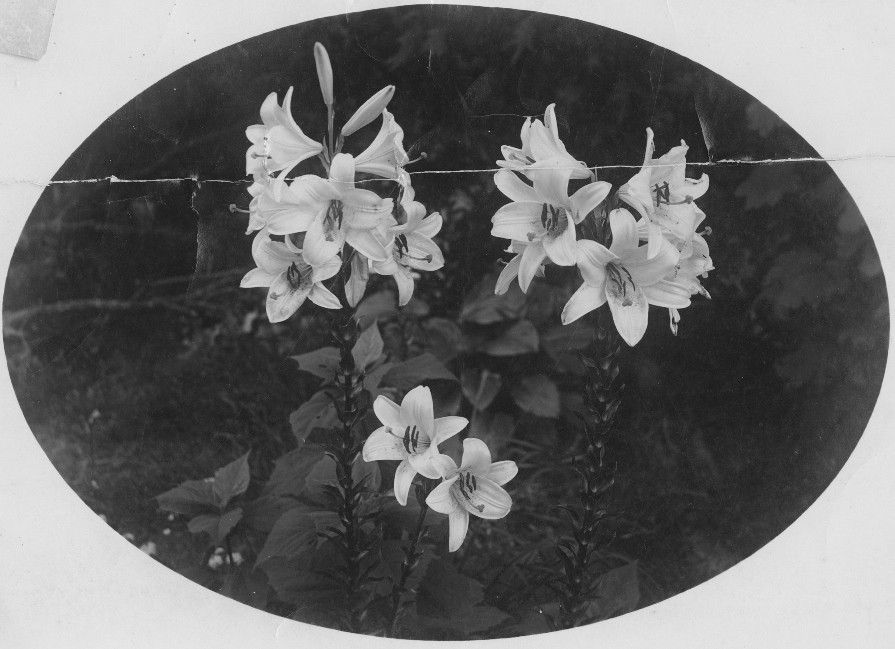Back at the “dirt farm in Van” as Dad called it, work was plentiful. After bending a dozen nails and breaking a hoe, I was put in charge of the chickens and pond. “Just bring in some eggs and a few catfish or bream now and then,” Dad pleaded.
His plan centered on a crop of fast-growing sorghum. We were going to turn it into molasses at the end of the season. Dad was already tallying jars to sell to the general store at nearby Ethel and at Ballard’s Mercantile. He had acquired a mule, so we planted a big garden too. I got used to eating greens, baby taters and double-yolker omelets. Most days I found time to sneak off and see what LC was up to.
The Brown farm, a much larger piece of land than ours, was located between Van and Ethel. One midsummer afternoon I met LC coming down the dusty road. Recognizing me from a distance, he plunked down in the shade and waited. “There’s a horse race today at the big cypress,” he hollered when I was still a ways off, a revelation that set me running.
I never saw a real horse race. Whenever Aunt Eula would go on about the glory days of Oaklawn Park over in Hot Springs, Momma called it scandalous. As we walked, LC described the scene: after taking off from the big cypress, the horsemen would gallop over a mile to the general store in Ethel where the winner got a cold Coca-Cola and folks collected their bets. Part of the track went through the woods. “My uncle was on the crew that built this road,” said LC. “When they got to the cypress tree, there wasn’t a saw blade big enough to cut it, so they built the road to Ethel around it.”
We veered off to the bottoms as shouts of laughter and the jingle of harnesses sounded ahead. Soon we entered a cypress grove containing more drylanders and horseflesh than I had ever seen gathered in one place. At the center of the hubbub, the giant tree rose up like a mountain, with knees 10 feet tall! I stared up at the faraway treetop, where an eagle’s nest wedged between branches. “During rainy years it takes a canoe to get here,” LC observed. “A dry spell like this is good racing weather.”
Six tall farm boys swung into saddles. I like Palominos; there was a fine one prancing about, also some chestnut quarterhorses and a paint pony. Men young and old ranged around swapping bets. LC stood in conversation with an older boy named John, whose family kept a houseboat downriver from Uncle Harold. I knew John by reputation as one of the best mussel-shellers in St Charles; despite being small of stature he could shoulder a helmet and stay under water longer than anybody. Suddenly the crowd grew quiet and a man hollered something, lifting his pistol skyward. A shot rang out and the horses broke away in a cloud of dust and yelling.
Some folks ran to the road and jumped in automobiles; a few followed on horseback or mule. By the time John, LC and I made it to Ethel on foot, the race was over and one of the Jenkins boys had won on the paint pony. All the girls from school were there, milling around and gushing over the horses and the Jenkins boys. Some of the girls had made a garland of roses for the winner. John and LC rolled their eyes at the spectacle. “Let’s go fishing,” John said, tearing up his slip. “I’d rather bet on something I can eat than a horse race anyhow.”
The following week there was a revival down on the White River. Despite his aversion to indoor churchgoing, Uncle Harold never missed a chance to take Altha Ray to the brush arbor. I tried to get Dad to come, but he just shook his head. “God don’t want me and Hell’s already full,” he declared. He insisted I wash behind my ears and put on a clean shirt, muttering, “Your momma always wanted to see you baptized.” I had no such plans; I just wanted to see what all the fuss was about.
Every summer on the River, folks cut lengths of cane and willow branches to fashion a rectangular open-air structure. Then they made a brush arbor, roofing the frame with branches while girls braided lengths of flower-vines and wrapped them around the posts. Honeysuckle, virgin’s bower and maypops dangled everywhere, heady with perfume, all within a stone’s throw of the River. Rows of benches were set up and lanterns hung. Preacher Burton surveyed the scene with satisfaction. He’d come down from Skunk Holler by way of Possum Waller to baptize the faithful and eat catfish and barbecue.
I rode with LC’s family to St. Charles (Wolf stayed behind, consigned to the barn). The buckboard wagon joined a line of others as we neared the River. “I hear the Jenkins boys are up to something,” LC said. “We’d better keep an eye out.” His dad pulled the buckboard into the shade and we ran to find John, who had already heard the rumor about the Jenkins boys. Plenty of families were arriving as the sun rose higher. At every turn, groups of giddy mothers showed off their new babies, exclaiming over each other.
“Let’s get away from this hen party,” muttered John. We took a bench in the back of the brush arbor but saw no sign of the Jenkins boys. “Looks like they’re planning a surprise attack,” LC said as John nodded gravely. I had only a vague notion of the Jenkins boys; like John, they were already past 9th grade and out of school. Beside the winner of the horse race, there were several more just like him, big and boisterous and always into something. “The Jenkinses are the best pranksters in Arkansas County,” LC remarked in admiration. Uncle Harold and Altha Ray came over to greet us and the seats began filling up as Preacher Burton stepped to the fore.
There were some farm-related prayers for the crops to increase and good weather to continue; beyond that I got lost in daydreams, drowsy from the heat. After a break for a few baptisms and a picnic lunch, the sermonizing started up again for the duration of the afternoon, punctuated occasionally by hymns. I fidgeted on the hard bench. The babies started fussing too; each time, the mother would get up and take the baby over to where the buckboards were parked in the shade. After tending to the baby, the mother wrapped it and tucked it in the wagon to sleep til the sermon was over. As Preacher Burton droned on, I wished I were asleep on a quilt pallet in a buckboard, too.
Preacher Burton finally ran out of steam around sunset. The contented crowd was headed home when a scream pierced the air. “This ain’t little Jimmy!” a woman shrieked from a nearby wagon. The line of buckboards slowed as a babble of voices arose: “Whose baby have we got?” “Why, this isn’t Opal—it’s Clara’s niece!” Women poured into the road, rushing hysterically from wagon to wagon. “Lord,” LC cried, awestruck. “I hope there ain’t a catfight.” Folks exchanged squalling babies, hollering above the din, “The Jenkins boys!”
The revival went on for days, but I stayed home from then on to work with Dad and avoid any chance at getting baptized. LC showed up one day when we were sitting down to dinner (he seemed to always know when to show up) and as Dad piled ham and biscuits on his plate, he offered up the latest news of the Jenkins boys.
“After a couple days of folks’ babies getting switched around, those drylanders took to checking their babies before they left for home,” LC grinned. He described how the Jenkins boys themselves finally showed up and sat in the back row. No one knew what to expect. At the height of Preacher Burton’s oration, the Jenkins boys began scraping their big old work boots on the ground, crunching the brush arbor’s floor of crushed mussel shells. Preacher Burton merely increased his volume. This ordeal went on for the entire book of Job.
“The next day was the last day of the revival,” LC continued, “Preacher Burton shows up to the pulpit, takes his Bible and sets it down. He pulls out his big pocket watch and puts that down beside. And then he brings out his Schofield pistol, lays it on top of the Bible and says, ‘I come here to preach the word of the Lord. But anybody in back want to make noise, I’ll be happy to send him to Hell!’”
Things quieted down considerably after the revival, and Dad spent the rest of the summer trying to make a farmer out of me. “I don’t know as you’re much of a farmer,” he would sigh. “But at least you’re not a preacher, nor a prankster.”
Copywright 2016 by Denise White Parkinson
